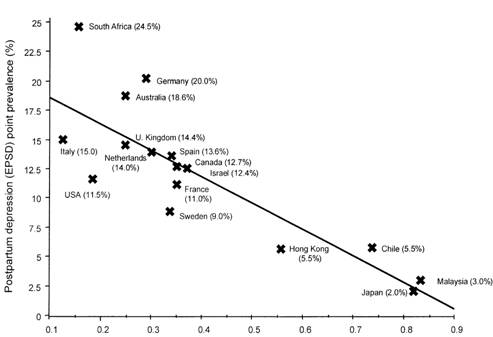Omega-3s and mental illness.
On February 8, 2018, CAPT. Joe Hibbeln presented evidence for the Omega-3 HUFA, EPA(20:5n-3) decreasing major depression (21:33 min video).
Efficacy of omega-3 HUFA in treating depression.
Trials evaluating efficacy of omega-3 highly unsaturated fatty acids (HUFAs) in major depressive disorder report discrepant findings. Reasons for inconsistent findings were sought with an exploratory hypothesis-testing meta-analysis of 35 RCTs including 6,665 participants receiving omega-3 HUFAs and 4,373 participants receiving placebo. Among participants with diagnosed depression, eicosapentaenoic acid (EPA)-predominant formulations (>50% EPA) had clinical benefits compared with placebo (P<0.001) whereas docosahexaenoic acid (DHA)-predominant formulations (>50% DHA) did not. EPA failed to lower depressive symptoms among populations not diagnosed for depression. Hallahan B, Ryan T, Hibbeln JR, Murray IT, Glynn S, Ramsden CE, SanGiovanni JP, Davis JM. Efficacy of omega-3 highly unsaturated fatty acids in the treatment of depression. Br J Psychiatry. 2016 Sep;209(3):192-201. doi: 10.1192/bjp.bp.114.160242. PMID: 27103682
DHA content of mothers’ milk is inverse to postpartum depression.
The abundance of DHA in breast milk depends on the supply of n-3 nutrients eaten. Mothers selectivly transfer docosahexaenoic acid (DHA) through the placenta to their fetuses during pregnancy. With insufficient dietary intake, mothers become depleted of DHA. Lower seafood consumption and lower DHA content in mothers’ milk are associated with higher rates of postpartum depression.
 DHA contents of mothers’ milk was related to the foods that nursing mothers ate. Higher amounts in milk related to a lower prevalence of postpartum depression. Prevalence rates in Australia , Sweden , United Kingdom and United States were derived by meta-analysis of published data. All other countries are represented by a single study, DHA content of mother’s milk is expressed as the weight percent of docosahexaenoic acid of mature milk. This Figure is from a paper by J.R. Hibbeln published in the Journal of Affective Disorders 69 (2002) 15-29.
DHA contents of mothers’ milk was related to the foods that nursing mothers ate. Higher amounts in milk related to a lower prevalence of postpartum depression. Prevalence rates in Australia , Sweden , United Kingdom and United States were derived by meta-analysis of published data. All other countries are represented by a single study, DHA content of mother’s milk is expressed as the weight percent of docosahexaenoic acid of mature milk. This Figure is from a paper by J.R. Hibbeln published in the Journal of Affective Disorders 69 (2002) 15-29.
updated February, 2018
